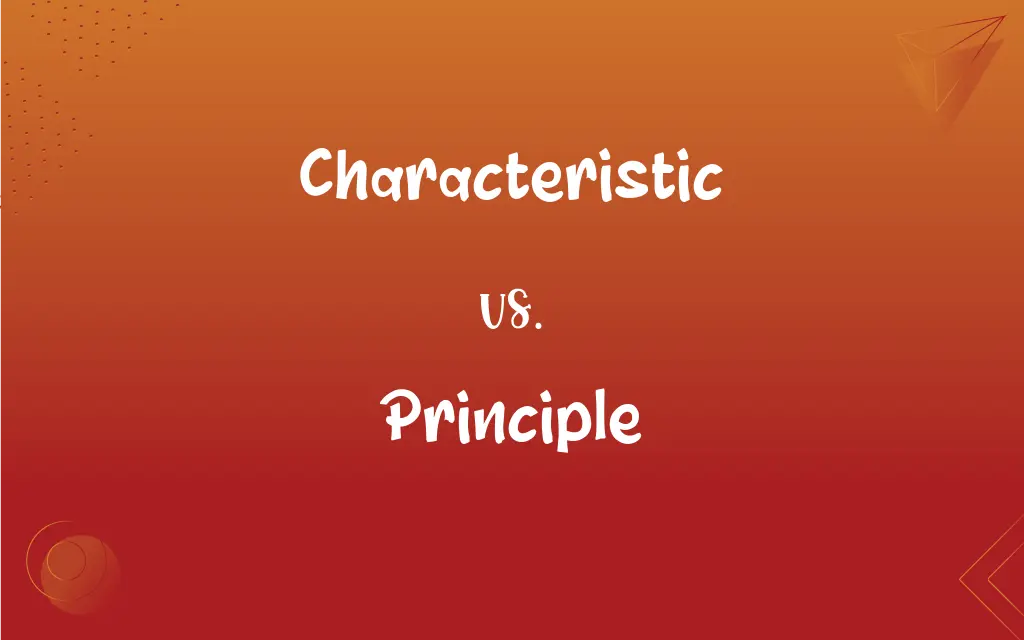Characteristic vs. Principle: What's the Difference?
Edited by Janet White || By Harlon Moss || Published on November 24, 2023
Characteristic is a distinguishing feature or quality, while principle is a fundamental truth or proposition serving as a foundation for belief or action.

Key Differences
Characteristic refers to a quality or feature that typically belongs to a person, thing, or group. It's about what makes something or someone distinctive. For instance, blue eyes can be a characteristic of a certain family.
Principle, on the other hand, is a fundamental truth or belief that serves as the foundation for a system of belief or behavior. It's a rule or belief governing one's personal behavior or the conducting of an activity.
Characteristics are often used to describe the traits or features of objects, animals, or people. They can be physical, like the color of leaves, or behavioral, like the friendliness of a person.
Principles are more about moral or ethical guidelines. They are often used in the context of personal ethics, such as the principle of honesty, or in systems like scientific principles guiding research.
While characteristics define what something is or what qualities it possesses, principles guide how one should act or believe. Characteristics are descriptive, and principles are prescriptive.
ADVERTISEMENT
Comparison Chart
Definition
Distinguishing feature or quality
Fundamental truth or proposition
Context
Describes traits or features
Governs beliefs or actions
Usage
Physical or behavioral traits
Moral or ethical guidelines
Nature
Descriptive
Prescriptive
Examples
"Characteristic blue eyes"
"Principle of fairness"
ADVERTISEMENT
Characteristic and Principle Definitions
Characteristic
Typical quality.
His characteristic humor lightened the mood.
Principle
Fundamental truth.
The principle of gravity explains the fall.
Characteristic
Representative trait.
The characteristic flavor of cinnamon.
Principle
Moral standard.
He adhered to the principle of honesty.
Characteristic
Distinguishing feature.
The characteristic spots of a leopard.
Principle
Guiding belief.
The principle of equality guided her decisions.
Characteristic
Identifying aspect.
Her characteristic patience was admirable.
Principle
Ethical guideline.
Following the principle of respect is essential.
Characteristic
Defining attribute.
The characteristic simplicity of the design.
Principle
Basic rule.
The principles of physics are fascinating.
Characteristic
Being a feature that helps to distinguish a person or thing; distinctive
Heard my friend's characteristic laugh.
The stripes that are characteristic of the zebra.
Principle
A basic truth, law, or assumption
The principles of democracy.
Characteristic
A feature that helps to identify, tell apart, or describe recognizably; a distinguishing mark or trait.
Principle
A rule or standard, especially of good behavior
A man of principle.
FAQs
Is "characteristic" used in biology?
Yes, like genetic characteristics.
Can "characteristic" be innate?
Yes, like a characteristic talent.
Is "principle" always moral?
Often, but it can be scientific too.
Is "principle" religious?
It can be, like religious principles.
Do "characteristics" change?
Some can, like learned behaviors.
Are "characteristics" measurable?
Some are, like physical traits.
Do "principles" vary culturally?
Yes, they can differ across cultures.
Can "principles" be personal?
Yes, like personal ethical principles.
Is "principle" used in science?
Yes, like principles of chemistry.
Does "characteristic" relate to identity?
It can, as part of one's makeup.
Do "principles" apply in law?
Yes, like legal principles.
Can "principles" conflict?
Yes, leading to ethical dilemmas.
Can "principles" evolve?
Yes, as understanding or beliefs change.
Can "characteristic" refer to groups?
Yes, like characteristics of a species.
Is "principle" abstract?
Often, as it's a guiding belief.
Are "characteristics" always visible?
No, some are behavioral or mental.
Do "principles" guide decisions?
Yes, they often influence choices.
Can "characteristic" be a skill?
Yes, like a characteristic ability.
Can "characteristic" be negative?
Yes, like a characteristic flaw.
Does "characteristic" imply uniqueness?
Not always; it can be common.
About Author
Written by
Harlon MossHarlon is a seasoned quality moderator and accomplished content writer for Difference Wiki. An alumnus of the prestigious University of California, he earned his degree in Computer Science. Leveraging his academic background, Harlon brings a meticulous and informed perspective to his work, ensuring content accuracy and excellence.
Edited by
Janet WhiteJanet White has been an esteemed writer and blogger for Difference Wiki. Holding a Master's degree in Science and Medical Journalism from the prestigious Boston University, she has consistently demonstrated her expertise and passion for her field. When she's not immersed in her work, Janet relishes her time exercising, delving into a good book, and cherishing moments with friends and family.







































































